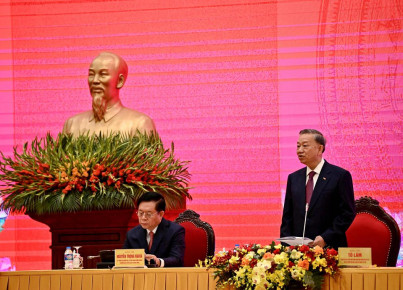The first all-Vietnamese automaker has big plans for the future. The competition is strong and there are many obstacles to overcome, but the company has been included by TIME among the most influential in the world
By Francesco Mattogno
Few even among Formula 1 fans remember the Hanoi circuit. Not because of the characteristics of the track, with a questionable layout, but because the Vietnam Grand Prix only existed on paper, or in the virtual world. The race, which should have debuted in 2020, was first postponed for a year due to the Covid pandemic and finally permanently removed from the Formula 1 calendar, despite a ten-year contract signed in 2018 (a decision also influenced by the anti-corruption campaign that hit some of the event organizers). Today anyone who wants can "race" in the Hanoi circuit only on the Formula 1 2020 video game, in which it had been inserted beforehand.
It would have been the second Grand Prix of the category in South-East Asia (after that of Singapore), but also the first major showcase for VinFast, a Vietnamese car manufacturer part of the Vingroup conglomerate. The announcement with great fanfare and the subsequent cancellation of the race, for which Vingroup would have been the main sponsor, fit perfectly into the path of ups and downs that has characterized the short history of VinFast up to now. The company was founded in 2017 by will of Pham Nhat Vuong, president, major shareholder and founder in 2002 of Vingroup itself, which within twenty years has become the largest private Vietnamese company thanks to the activities of its subsidiaries, operating mainly in real estate, technology and services sectors.
Vingroup's great growth has made Vuong the first billionaire in Vietnam's history and consequently one of the country's most prominent public figures, who is also believed to be very close to the leadership of the ruling Communist Party. A position of strength that pushed Vuong to invest in a hypercompetitive sector such as the automotive one, with the idea of making VinFast a brand specialized in the production of electric vehicles. And also making it a matter of national pride.
Vingroup's plan was to make VinFast the first all-Vietnamese automaker, as the industry's other major brand, Truong Hai Auto Corporation (THACO), makes vehicles for large foreign companies such as BMW, Hyundai and Kia. It is no coincidence that the inauguration ceremony of the Haiphong production plant, still today the only VinFast factory in Vietnam, was organized on 2 September 2017, on the 72nd anniversary of the declaration of independence from France pronounced by Ho Chi Minh in 1945 .
VinFast started shipping its first cars to Vietnam in June 2019, two years after its founding, but only entered the electric vehicle market in 2022 (at first it mainly produced cars with combustion engines). 2022 is also the year in which Vuong kicked off the company's international expansion plan, which began to focus entirely on electric. Vingroup first signed a preliminary agreement worth two billion dollars with the US county of Chatham (North Carolina) for the construction of the first VinFast factory abroad, then it agreed with Intel to jointly develop technologies for autonomous driving of vehicles.
Also in 2022, another subsidiary of the conglomerate, VinES Energy Solution, started construction of an electric car battery factory together with China's Gotion High-Tech, in Vietnam's Ha Tinh province. VinES then merged with VinFast the following year. Vingroup's large investments laid the foundations for VinFast's stock market listing in the United States, on the Nasdaq, but they also hid a certain frenzy on the part of the group to make the company truly competitive in the electric sector.
In 2023 the company sold 34,855 electric cars, a figure much higher than that of 2022 (7,400) but still lower than the target of 50 thousand deliveries set by the company, which just last year began shipping cars, scooters and electric buses also outside Vietnam. Beyond the net losses, which in 2023 reached 2.39 billion dollars (+14.7% compared to 2022), what is especially worrying are the details. If it is true that VinFast delivered around 35 thousand vehicles in 2023, more than 72% of these were "sold" to Green and Smart Mobility (GSM), a subsidiary taxi company of Vingroup.
In the first days, VinFast's capitalization was the third highest among global car brands, behind only Tesla and Toyota, but as time passed the value of the Vietnamese company's shares collapsed by more than 95% compared to its peak initial. Analysts have spoken of a "meme title", inflated by the great interest aroused in it by the international media and social networks. On the other hand, even today the brand, despite the many negative reviews on its products, enjoys good press: for example, TIME has included VinFast in the list of the 100 most influential companies of 2024.
In recent months the Vietnamese company has found itself forced to withdraw hundreds of cars already delivered due to safety problems (such as faulty airbags) or the poor quality of components, as well as facing various legal disputes. In the United States, an investigation has been launched to ascertain the cause of the death of four people, including two children, due to the VF 8 they were traveling in crashing into a tree. The car, which also caught fire, may have had problems with its autonomous driving system. VinFast was then sued by AncelorMittal for the theft of intellectual property regarding some steel components used in its vehicles, while in April several investors sued the company, accusing it of artificially inflating the value of its shares on the Nasdaq.
Vista la situazione complicata, a gennaio Vuong ha preso le redini del progetto auto-nominandosi amministratore delegato dell’azienda, e diventando così il quarto CEO di VinFast negli ultimi tre anni. Nonostante i tanti intoppi, che avrebbero potuto suggerire un ridimensionamento di VinFast, Vingroup sembra invece intenzionata ad aumentare progressivamente obiettivi e investimenti. La casa ha dichiarato di voler arrivare a vendere 100 mila veicoli elettrici nel 2024, fissando poi una soglia di 750 mila consegne annuali entro il 2026.
To do this, in addition to large injections of liquidity (Vingroup and Vuong have invested more than 11 billion dollars in VinFast since 2017), the company has said it intends to expand into at least 50 international markets by the end of the year. In just a few months, VinFast has opened various offices in Europe and signed agreements for the sale of its cars in Ghana, Thailand, Micronesia and the Philippines, while it is strengthening its charging station infrastructure and planning the construction of two more production plants, in India and Indonesia, which would be added to that in the United States.
“VinFast is entering a highly competitive electric vehicle market, against established legacy brands and in the midst of a price war,” analyst Chris Robinson told the Nikkei. And this could be his biggest obstacle.






